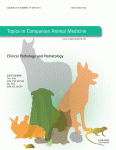
The panel of laboratory tests available for diagnosis of gastrointestinal (GI) diseases in dogs and cats is wide, and, recently, several new tests have been developed. This article will focus on advances in laboratory tests that are available for the general practitioner for diagnosis of GI diseases.
Laboratory tests for diagnosis of gastric and intestinal infectious diseases include fecal parasite screening tests, enzyme-linked immunosorbent assays for parvoviral enteritis, and some specific bacterial tests like fluorescent in situ hybridization for identification of specific bacteria attached to the intestinal epithelial cells.
Serum concentrations of folate and cobalamin are markers of intestinal absorption, but are also changed in exocrine pancreatic insufficiency and intestinal bacterial overgrowth. Hypocobalaminemia is common in GI and pancreatic disease. Decreased serum trypsin-like immunoreactivity is a very sensitive and specific test for the diagnosis of exocrine pancreatic insufficiency in dogs and cats. Serum pancreatic lipase is currently the most sensitive and specific test to identify pancreatic cell damage and acute pancreatitis. However, serum canine pancreas-specific lipase is less sensitive in canine chronic pancreatitis. Increased serum trypsin-like immunoreactivity is also specific for pancreatic damage but is less sensitive. It is very likely that further studies will help to better specify the role of these new tests in the diagnosis of canine and feline pancreatic diseases.